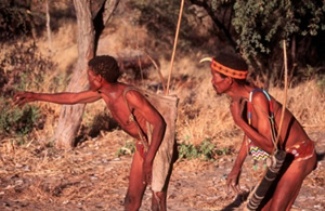The fight for land rights and freedom in South Africa goes back more than 100 years. Our history is littered with injustices and the systematic exploitation of black people. Those who colonised South Africa set about crushing indigenous resistance against it by groups such as the San, Nama, Griqua, Korana and Cape Khoi.
Therefore, as we celebrate Freedom Month we must honour our struggle heroes, including those from the Khoi-San community who fought valiantly against colonialism and the deliberate abuse of their human rights. The Khoi-San people who are regarded as the first indigenous people in the country, waged battles against slavery, oppression, exploitation and segregation. Khoi-San leaders such as Autshumato and Chief David Stuurman were some of the first political prisoners to be sent to Robben Island.
These brave men and their followers also fought against the dispossession of land that began before the promulgation of the 1913 Land Act. The violent dispossession of land not only resulted in the erosion of cultural values and livelihoods, it also destroyed the traditional African way of living as one family unit.
The legendary freedom fighter O R Tambo best described this traditional African way of living and spoke about their deep love for the land as follows: “In African epochs, long before the coming of the colonial masters from their northern climes three or four centuries ago, men and woman moved skillfully and purposefully across the terrain, plucking from the earth its bounty.
“Trained to utilise a variety of means for their survival, they employed the art of the hunt, the judicious selection of fruits of the wild, the identification of the lushest pastures for their livestock, the cultivation of the most reliable staple foods; the growth of trade, the establishment of collective social structures and a world view, despite the occasional clash of interests between one clan and another, of the practical value of warm relationships and a deep respect for a shared humanity.”
When the new democratic government assumed office in 1994 it immediately set about undoing past injustices in a responsible way. It incorporated the principles of the Freedom Charter into the Constitution which demanded, among others the redistribution of the land, the transfer of practical knowledge to use it effectively and to the advantage of the recipients, as well as the abolition of any restrictions on movement of people.
“to deny any person their human rights is to challenge their very humanity”.
Since 1994, the Government has been addressing land reform through restitution, redistribution and tenure reform. This approach, according to President Jacob Zuma is guided by the national policy of reconciliation and nation building. The consequence of apartheid and colonisation that goes back to more than 100 years cannot be overcome in just nineteen years; however we have to recognise, and applaud the fact that government has made significant strides in realising peoples’ right to land, territories and resources.
In the State of the Nation Address this year, President Jacob Zuma announced the re-opening of the lodgement of land claims to those who were unable to meet the deadline of 31 December 1998; and the creation of exceptions to the 1913 Natives Land Acts for heritage sites, historic landmarks, including opportunities for the descendants of the Khoi and San to claim.
The two-day National Khoi-San Indaba held in Kimberly last week gives substance to government’s efforts to respond to the needs of Khoi and San communities and further strengthen social cohesion in the country. According to the Department of Traditional Affairs, the aim of the Indaba was to stimulate discussion between the Government; National Khoi and San communities and to reflect on progress made in recognising, promoting and protecting the rights of the Khoi and San communities.
Speaking at the end of the event the Minister of Rural Development and Land Reform Gugile Nkwinti said: “It re-affirms Government’s commitment to address the concerns and needs of the Khoi and San communities and to social cohesion and nation building.”
Participants used this opportunity to further explore President Zuma’s announcement on the re-opening of the lodgement of land claims. According to the Department of Rural Development and Land Reform, the representative structures of the Khoi-San which included the National House of Traditional Leaders and the National Khoi-San Council and other government departments such as Traditional Affairs, Arts and Culture, Agriculture, Forestry and Fisheries, Tourism, Environmental Affairs and Minerals and Energy contributed significantly to the success of this Indaba.
Minister Nkwinti further added that “the inputs made during this Dialogue will lay a solid foundation that will help the Government in the process of the lodgement of the claims by the descendents of the Khoi and San”. The ultimate goal as highlighted by Minister Nkwinti during a post SoNA media briefing this year is “to restore land, human dignity and respect to all South Africans”.
To quote former President Nelson Mandela, “to deny any person their human rights is to challenge their very humanity”. As we prepare to commemorate the centenary of the 1913 Land Act, we call on all South Africans to engage in a meaningful debate about the acceleration of land restitution within our constitutional framework. Working together we can ensure that the repossession of lost land which was one of the tenets of our quest for liberation is achieved.
Phumla Williams is the Acting Chief Executive Officer of the Government Communication and Information System (GCIS).
– By COMMENT: Phumla Williams


